#tips on learning korean
Text
Look, I knew five languages by age 19 and now I am learning like 3 more. I work as a language instructor and a consultant. If I can give language learners only one advice, this is it.
STOP LEARNING WORDS ON THEIR OWN.
You're doing yourself a disservice by learning lists of "30 words you must know!" "100 most common words!" like it literally means nothing if you cannot use those words in an appropriate context with proper grammar. So what you actually need to do is learn those words via example sentences.
Of course, sentences have more words so you may think you're learning less but you're actually learning the way to use it in context. That's what's important.
Language is about communication, which also means if you want to learn languages, you have to observe how people communicate with each other universally. Native speakers never have a list of words they know and they don't count every single new word they've learned. So why are you doing it to yourself? What native speakers do is listen to the new word, remember the context they're spoken in, and keep using that word in that context. And that's why people go "wait, you can use that word LIKE THAT?" all the time. So you, a language learner, are also allowed to do that. I'm not even saying those word lists are useless but they're the most useful AFTER you've known most of them and are trying to go over them for practice etc. Native speakers do click on those word lists to check out how many words they don't know or to remind themselves of those words or to learn some facts about each word. That should be your goal as well.
Learn sentences. Learn them in context. Do not fall into the "I must know xx amount of words or I'm a failure at language learning" trap perpetuated by bloggers or youtubers or whatever. Have fun with it!
#language learning#studyblr#langblr#100 days of productivity#chinese studyblr#japanese studyblr#korean studyblr#how to learn#learning#academia#academic#academics#language study#language#languages#study tip#study#study motivation
289 notes
·
View notes
Text
Checklist for starting a language
- (if needed) learn the alphabet
- basic grammar for forming words and pronunciation
This process alone would take a few hours maybe 2-3 depending on the difficulty and the difficulty depends on your native language
- 1000 most common words in your native language (translate to target language)
Translate favorite medias into target language
This could be songs, movie quotes, scenes, or anything from your own writing.
Attempt to pronounce these by looking at the writing.
I’ve been making flash cards for alphabet and sounds
I’m new to language learning so if anything I said is less effective than another strategy please let me know.
#language learning#polyglot#study tips#korean language#learn korean#learn japanese#langblr#korean langblr
399 notes
·
View notes
Text
anon asked: i am a beginner and I want to learn Korean. I know that you have your masterlist about what to do next and its really good to look for self study resources but i’m only 18 and i do not have money for a course to learn. what is your advice because i know you say to take a class when you can thank you so much
Coming out of this hiatus to say:
Take FREE classes on Coursera. This is not sponsored, not an ad, not a gimmick. If you’re really at a beginner level and you need that Academic Input of any language, please, please PLEASE take free courses where you can. If you want to take TTMIK too, please do that as well! It’s free to sign up and you don’t need the books.
Taking free Korean classes on Coursera has some awesome benefits from a linguistics standpoint. First off, you get a structured curriculum created by language experts who know their stuff. They break down the language step by step, so you can really understand how it works. Plus, the interactive lessons and exercises on Coursera keep things interesting and help you practice listening, speaking, reading, and writing. And here's the cool part: you can learn from experienced instructors and chat with other learners from around the world. So, if you want to dive into Korean (in a class like setting), give Coursera a shot.
You might have to self-regulate your studying -- as in, complete the course at your own pace. But if you’re diligent and motivated, then please check that out.
TTMIK
Coursera Korean Courses (browse a little (because not all of them are about learning Korean) and choose the free option)
Hope that helps! Happy Learning :)
~ sk101
#korean#Korean Langauge#korean language tips#korean language blog#Korean langblr#klangblr#langblr#study korean#learn korean
168 notes
·
View notes
Text
Hello! *shyly waving*
I've had this blog for a lil while and want to start posting original content asap but for now I'll try to make an intro post fisrt.
My blog is running on queue untill I gather some material to post. See you soon!
#studyblr#langblr#studyspo#study inspo#japanese#nihongo#korean#chinese#mandarin#study motivation#study notes#study space#language learning#language#languages#college#academia#student#bookworm#bujoinspo#study blog#study inspiration#study tips#studying#studyblr community#studyinspo#student life#study aesthetic#mine
27 notes
·
View notes
Note
hiii! <3 💕💞
im sure you have been asked this question a lot, so i apologize if its bothersome 🥹, but isnt it hard to study both chinese and japanese at the same time? ive been thinking about picking up on some chinese myself, but i always worry that ill end up confusing some readings of the chinese symbols with the japanese onyomi readings for kanji.
so i guess my question is, how do you manage? 🥺
and good luck for your february goals <333 💞💖🫶🏻
hi hana! どうもありがと, thank you so much 💖 大丈夫, no need to apologize, you're never a bother 🥺 to answer your question... yes, i am always confused 😂
BUT here's where it comes in handy that i'm also learning Korean! Because Korean 🤝 Japanese on phonetics and sentence structure but Chinese 🤝 Japanese on Kanji characters and their semantics!
so i've ended up in a situation where my listening skills for Japanese are better than my reading skills and if there's a Kanji character, then i probably know the meaning, but maybe not the pronunciation in Japanese because what i know from Chinese is overriding it 🤡 i plan to do a lot more Kanji review + Japanese comprehensible input to address this gap 👌
i'm barely at N5 in Japanese though (that's my goal for this year hehe) and i'm coming from the opposite perspective (Chinese > Japanese) than you (Japanese > Chinese), but i hope this is still helpful for you to at least get some ideas for how to tackle your own journey! 頑張ります! 💕
💌 if anyone else with experience learning Japanese + Chinese sees this and has anything to add please do! 🙏
#studyblr#japanese langblr#chinese langblr#korean langblr#asks#친구#study advice#learning languages#langblr#language learning#language study#language stuff#multilingual#polyglot#study tips
18 notes
·
View notes
Photo
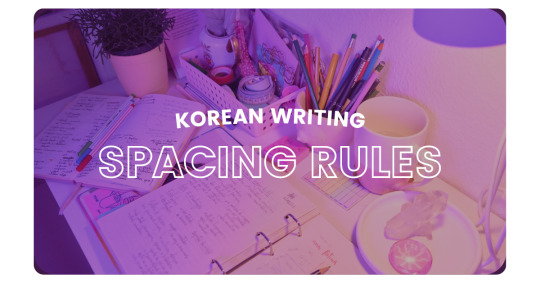
Writing in Korean can be quite complex when it comes to spacing (띄어쓰기), as it involves several factors like grammar, sentence structure, and even the type of words. In this article, I’ll share some of the most important rules I’ve learned with you.
1. Particles:
Korean uses particles to indicate grammatical relationships between words in a sentence. To ensure clarity, it is essential to separate these particles from the following words. Some commonly used particles in Korean include 은/는, 이/가, 을/를, 에, 에서, (으)로, 에게, 도, 와/과, and so on.
For example, in the sentence “저는 한국에서 떡볶이를 먹었습니다” (I ate Tteokbokki in Korea), there are three particles used: 는, 에서, and 를. To make it clear, it is essential to add spaces after each particle.
It is essential to note that particles are included as part of the preceding word. Therefore, particles are not standalone words and should be attached to the word they modify without spaces.
2. Independent Nouns:
In some sentences, there may be two or three nouns put together to form a noun phrase. In constructing such phrases, it is generally advisable to separate each independent noun with a space.
For example, “한국 음식” (Korean Food) and “경영 대학교” (Business University) both consist of multiple nouns that should be separated by spaces.
However, there are exceptions to this rule:
Compound Words: When words are combined to create a new meaning, they should be written without spaces. For example, “tear” in Korean is “눈물”, a compound word made up of 눈 (eyes) and 물 (water). This word should be written together as “눈물” without a space between them. The same applies to verbs such as “to visit,” which is “방문하다”, a compound word made up of “방문” (visit) and “하다” (to do).
Proper Nouns: If the noun phrase is a commonly used or official name, such “한국관광공사” (Korean Tourism Organization) or “국립중앙박물관” (National Museum of Korea), it is standard to write the entire phrase without spaces. Doing so makes it more easily recognizable as a specific entity or organization.
3. Person’s Name and Title
Korean personal names consist of a surname and a given name, both of which have independent meanings and can be used as separate words. Although it can be argued that they should be written separately, personal names are unique nouns, and Korean surnames are usually only one syllable, making them feel incomplete on their own. Therefore, it is customary to write personal names without spaces between the surname and given name.
For example, “Park Ji-min” is written as “박지민,” “Kim Min-seok” is “김민석,” and “Lee Min-ho” is “이민호,” all without spaces.
However, when titles or job names follow a personal name, they are separate units and should be written with a space between them.
For example: 박지민 씨 (Mr. Park Ji-min), 민수철 교수 (Professor Min Su-cheol), 김 의사님 (Doctor Kim) all have a space between the personal name and the title or job name.
4. Numbers and counters:
In Korean, spacing is used between every ten thousand when writing numbers. This means that if you have a number with five digits or more, you will use a space to separate the digits in groups of four.
For example:
이천이십삼 (2023)
구만 팔천칠백육십오 (98765)
일억 이천삼백사십오만 육천칠백팔십구 (123456789)
When it comes to combining numbers with counters, there are two cases to consider:
If you write the number in digits, there is no space between the number and the counter. For example, “1개” (one piece), “2번” (two times), and “3명” (three people) have no space between the number and the counter.
However, if you write the number in words, there should be a space between the written number and the counter. For example, “삼 학년” (third grade), “칠천 원” (seven thousand won), and “칠 개월” (seven months) have a space between the written number and the counter.
5. Word modifiers:
When a modifier (such as an adjective, verb, or adverb) modifies a word, it should be separated from the word by a space. This helps to clarify the relationship between the two words and make the sentence easier to read.
For example:
유나는 예쁜 여자예요 (Yuna is a pretty girl)
한국 와서 처음 먹은 음식 기억나요? (Do you remember the first food that you ate in Korea?)
저는 일을 잘 해요 (I do my job well)
All use spacing to separate the modifier from the word.
Additional Notes:
– It’s worth noting that there are certain grammatical structures in Korean that require specific spacing. For example, “(으)ㄴ 적이 있다” (have done in the past), “(으)ㄹ 수 있다” (can/be able to), “아/어 보다” (try doing) and so on. It’s important to pay attention to these spacing rules when learning Korean to ensure that your writing is accurate and clear.
– Finally, when using “이다” (to be) or “아니다” (to not be), it’s important to note that “이다” is written immediately after a noun, while “아니다” is written separately from the noun due to the particle. This is important to keep in mind when writing sentences that use these verbs.
For example:
학생입니다 (I’m a student)
학생이 아닙니다 (I’m not a student.)
The preceding explanation outlines my current understanding of the spacing rules when writing in Korean. However, I also want to point out that there might be some special cases or exceptions to these rules that I’m not aware of. So, if you have any experience with these special cases, I’d love to hear about it! Let’s share our knowledge and learn from each other.
🌸 🌼 🌻
Support me at: https://koreanlanguageloving.my.canva.site/
#Korean Language#Learn Korean#Study Korean#Hangul#korean langblr#Topik Writing#Korean Writing#Korean Topik#한국어공부중#한국어공부해요#한국어공부하기#한국어공부#한국어 공부#한국어#한국어수업#한국어 수업#한국어능력시험#Learning Tips#korean grammar
112 notes
·
View notes
Note
Hi Vincent! Since you're studying Japanese & Korean, I was wondering if there are any major differences in the way you approach studying each language? Especially since you are laddering Japanese and Korean.
Any helpful hints you've picked up on the way would be great too! ありがとう!
Oohhhh... This is a good question...
I think in terms of grammar I approach them similarly, by memorizing grammar by its function rather than by how it's translated, but when I review grammar I try to review my Korean by comparing to equivalent Japanese grammar. They're a lot easier to compare than either one with English, so it's easier since the word order is often the same and stuff.
But with Korean I think I use a lot more learning apps? Although that's mostly because the Korean resources around me aren't as plentiful as Japanese ones, so I can't get my hands on as much native reading material and stuff to practice. (And I'm not huge on k-dramas, haha)
Oh, another thing with my experience with Korean is that my learning community for it is much smaller- I couldn't really click with a lot of my classmates in Korean the same way I could with my classmates in Japanese (and there was one person in my Korean class who was kind of... A creep so I sort of avoided socializing in there in general), so a lot of my Korean learning is more independent. I won't lie that specific person being so like, uncomfortable to be around kinda killed my motivation to study Korean for a little while, so I really had to improve my internal motivations for studying to make sure I didn't give up.
In terms of tips and tricks I have, one thing I've made a habit of doing is writing down the equivalent Japanese grammar point next to each Korean grammar point in my textbooks! I'll write down conjugations with the same meanings, particles with the same meanings, and sometimes also phrases or vocab terms in Japanese next to the Korean headings and try to memorize based on that. It's usually pretty easy to do, honestly, since the English language textbooks I use for both languages describe things very similarly!
Also, I try to cut out English as much as possible when I learn new words in Korean! Like, I have the Learn Korean With BTS book, and in that the new vocab is only written in Korean, and then if I can't guess the word's meaning from the illustration they put with it, I'll listen to the audio translation in Japanese. I only use English if I'm totally lost because I don't know the word in either language and the illustration is confusing.
Hmm... Another tip I think is important is to not beat yourself up if you aren't "fully laddering" or something like that. If you sometimes have to go back to your native language to double check something, that's fine! It doesn't cancel out all the laddering if you have to go back sometimes to make sure you're actually understanding.
You can also usually find what textbooks Japanese universities use for their Korean language classes! I know Waseda puts all of their textbooks up on their class search and that's publicly available to look at, so you can go find whatever level of Korean textbook written in Japanese with Japanese explanations if you're advanced enough in Japanese!
I feel like laddering is pretty similar to immersion study in the sense that they can both feel pretty difficult and high-intensity even when you're just doing something basic. Completely getting rid of your native language makes things a lot more stressful, I think, so it can be harder. Even if you know that for you personally laddering will be a better way to learn it or more efficient or whatever, it can still feel kinda overwhelming to suddenly be trying to avoid your native language when you study, and I think it's important to remember that! Because sometimes it'll feel discouraging to be overwhelmed by "super basic stuff", but the way you're studying is more intense than studying using native language textbooks! So feeling overwhelmed by stuff you'd find "easy" in your native language is fine! Because it isn't your native language!
I dunno, I don't have many life hacks for it yet... But I hope this blurb helps somehow anyway!
#original post#ask#my korean classes themselves are also a lot faster paced#which i think influences how well im taking in korean#we go through multiple grammar points a day#so its more difficult to keep up#langblr#study advice#study tips#language learning#language laddering#studyblr#japanese#korean#motivation
39 notes
·
View notes
Text

yo, this is mitsu!
i am currently studying for uni ( a classic uni exam and an english exam for linguistic majors in my country) and also japanese
thinking it would be a cute way to track my studies and to get/give motivation as well!
#anime#studyblr#motivation#dark academia#chaotic academia#light academia#student#student life#language#language learning#kpop#jpop#studyspo#bookblr#workblr#genshin impact#langblr#lingblr#korean studyblr#japanese studyblr#chinese studyblr#introduction#new studyblr#japanese#nihongo#pinned intro#study motivation#education#school#study tips
10 notes
·
View notes
Text
My style of using flashcards (  ̄▽ ̄)
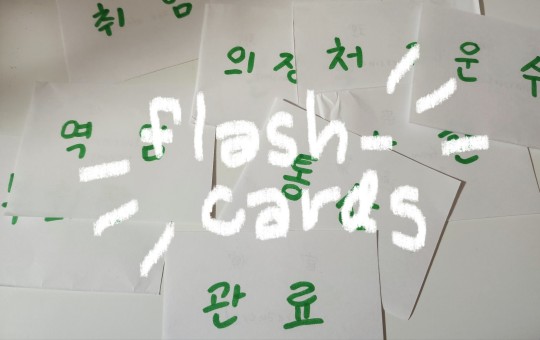
Yippee!
I've been using flashcards since elementary school and this is my favorite way of using them. I'll use Korean words to showcase my method.
Usually I'll have a main side and secondary side. I'll write the main side in large letters and use a fun color and the secondary one with black pen. Here I used green to contrast the black. Idk colors motivate me...
I'll have a few words from different categories every time.
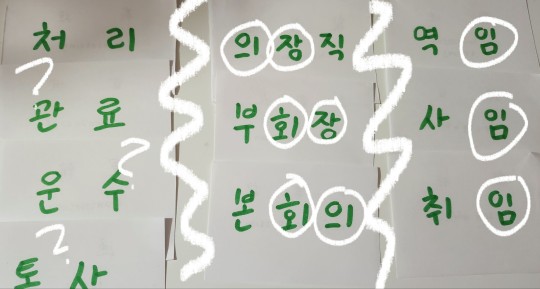
Here's what I mean: a few categories with similar-sounding words and one with random words. I never exclusively do similar-sounding words as I remember better when there are only a few similar ones.
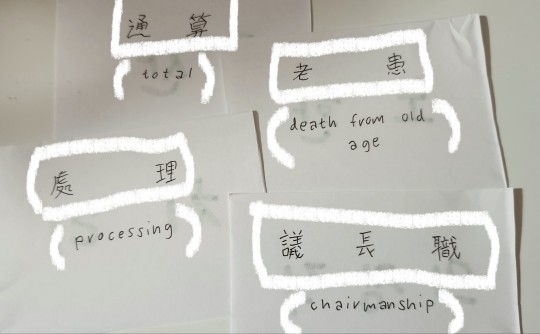
The secondary side has two definitions, usually either two writing systems or two languages (polyglot tingz) so I get as much out of these cards as I can. In this case, there's hanja and English!
I'll flip through a pack like this for a few days, usually 2-3. Then I'll make another one!
I'll take the pack out again in a month and if I don't remember a word, I'll add the word to my current pack! If old cards keep coming back, I'll stop making new ones and study the old ones until I remember.
#langblr#language#learning#korean#한국어#studyblr#flashcards#new words#words#learning tips#hanja#한자#한국어 공부
7 notes
·
View notes
Text
Finally, my intro!
About ; My name is Blanka, and I'm 16 years old! I'm generally unmotivated, but I have a goal in mind, which is to be an anthropologist, and to learn as many languages as I can! So I finally decided to open up a blog!
Languages ; Hungarian (native), English (C1), French (B1, used to be C2), Korean (A1)
Fav things? ; Kpop (NOT a koreaboo), Arcane (lol series), Jurassic park/world, history, poetry, true crime, COLD, Cold drinks.
#study notes#studyinspo#studystudystudy#studyspiration#student life#study inspiration#studygram#studywithme#study space#hungarian language#hungarian langblr#language learning tips#french langblr#korean langblr#Langblr#language learning#Studyblr
16 notes
·
View notes
Text
How to learn new foreign words 💡
7 steps - 7 days method to memorise new foreign words
Day 1
Write 25-30 words, but no random words. You can add pictures or combine these words with your native language words (ex. my 사랑 mother) ✍🏼
Day 2
Repeat these words and create flashcards. It is better to use Quizlet because it has a built-in translator and audio 🗃️
Day 3
Record audio how you pronounce words with intonation. Before recording, don’t be lazy to check all transcriptions or how native speakers pronounce them🗣️
Day 4
Go through your list of words again, put away paper and try to write as many words as you remember with translation 🧠
Day 5
Listen to your audio and while listening, write words (on day 3, when you record words, rearrange them). So this day you take dictation 👂🏼
Day 6
Flashcards 5-7 minutes or more (actually you can do them when you have a free minute during these days) ⏰
Day 7
In the morning, repeat words - say them out loud and write. While writing, try to combine with words you have already known. In the evening do it again 📚
Don’t forget to check these words with flashcards or audio from time to time adding new words 📆
#medicine inside#studyblr#study with me#study languages#study effectively#study english#how to learn new words#study tips#study hacks#study methods#study german#study korean#study session#studyspiration
97 notes
·
View notes
Text

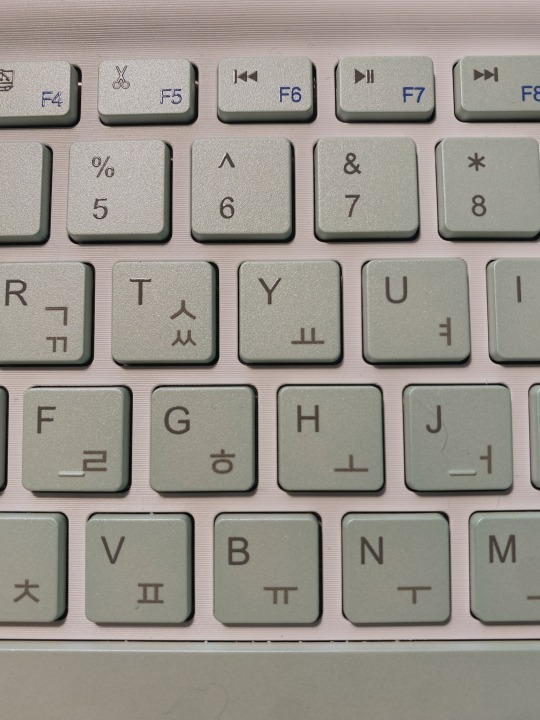


20220827 old notes ft my (empty) planner for september
to do:
- chapter 13 (and 14?) exercises
- chapter 15 vocab list, grammar notes, quizlet set
- chapters 12-14 quizlet revision
- number spelling exercises
song: i guess i loved you - YB
#studyblr#studyspo#studyblr community#studylustre#study blog#study inspiration#study motivation#langblr#learning languages#learning korean#adelinestudiess#boldlystudy#study space#emmastudies#student#studygram#pstudylatte#study area#study desk#study tips#study aesthetic#academia#gloomstudy#stray kids#myhoneststudyblr
95 notes
·
View notes
Text
I have two different strategies for when I’m studying in an online class setting. (This could also work in an in person setting depending on situation)
So for my korean class lessons are way more bite size.
They are split up into units with one lecture and one quiz per unit.
Since it’s a way more strict structure I do this strategy.
Watch lecture and take small notes during the lecture (most important things things you think may be on the quiz)
Then use the lecture notes posted by the teacher to really get a grasp on the subject. (If the teacher doesn’t post lecture notes you can ask them too or do extra research on the topic which I recommend)
Then study using your preferred method (lmk if you want me to post mine)
By the time the quiz comes around you should be prepare or at least have a good grasp on the subject. (Exams. I use a little different of a strategy I’ll post that soon)
Now for the second strategy.
In my introduction psychology class There are multiple lectures per unit and not many lecture notes so I rely on more what I like to call on sight active recall to help me here since I don’t have lecture notes to go back to.
I will watch the video or lecture and then as soon as it is done I will write down whatever I remember (this is where the online preference comes in)
After I do that I will try to make sense of everything I wrote and make connections (a lot of people do mind maps but I’m apparently crazy and put mine up on the wall with red string like a murder case)
After that I will rewatch the video or lecture and add in any details that I want to remember or fill in gaps of knowledge
Then (I have adhd so this is how I learn personally it might not work for others) I will make my notes look pretty. (The point is make them seem like you’re just drawing)
Then repeat based on lecture AFTER A BREAK (I don’t promote bad study habits even though we all have them. If you have to stay up all night at least take a nap in between study sessions)
#language learning#polyglot#learn japanese#learn korean#french langblr#langblr#learn french#learn languages#study games#study tips#studystudystudy#study motivation#studywithme#studyinspo#studyspiration#study hard#studyspo#study aesthetic#study challenge#studying#studyblr#studygram
12 notes
·
View notes
Text

👂Korean Listening Tips: Improve Listening Skills
Tip Number One: listen to material that is on your level / listen to the right material
Listening to korean dramas as a beginner is usually not the best idea to effectively improve your listening skills. Youtube videos are the better option, because Korean used in youtube videos is actually used in real life. On the other hand, dramas are scripted and not as natural.
Korean dramas also have a lot of niche vocabulary. For example, if you watch a drama about hospitals words like “blood pressure” or organ names or anything else like that will appear often. That’s one of the reasons dramas can be hard to understand.
Lingq app is a good place to find stories that you can read and listen to at the same time. Podcasts are also very good for listening practice.
Music doesn’t count in my opinion. If you started studying like a month or a few weeks ago maybe, but at that point I think you are much too new to practice listening in the way I mention in this post. You should keep learning more vocabulary & grammar before attempting active listening. Of course listening to the language is good to help familiarize yourself with the sounds, but don’t expect to understand more than a word or two here or there at your very beginner level.
Tip Number Two: don’t be aftaid of subtitles
I am against using ONLY English subtitles (or subtitles in other languages besides Koresn) whilst practicing listening in Korean. Try using Korean subtitles while you watch youtube videos and while you watch your favorite Korean dramas. For very beginners, using subs in your native language could be a chance to understand more and get familiarized with how fast Korean is and the different sounds. I suggest watching once with Eng subs & again with Korean subs
Tip Number Three: read more
Reading and listening are one in the same - they both have to do with taking in context and interpreting what that context means. In other words, reading will improve your listening skills and vice versa. You should read and listen to improve your overall comprehension of the Korean language.
As with listening materials, try to find things that are on your level to read. Maybe reading Harry Potter books in Korean as a beginner aren’t the best for this unfortunately. Lingq & Naver Blogs are good places to find things to read. You can also go to wattpad and find some rather interesting stories in Korean. You can read webtoons as well.
Tip Number Four: take it slow
Nothing wrong with changing the speed of a video or a drama to understand it better. Koreans do speak rather fast and slowing down your audio can help a bit. I would say listen to it normally once and then again slower and then again normally. Or you could start slow and then go back to normal audio. Listening to things more than once is a good thing too. You’ll catch things that you didn’t the first time around.
Tip Number Five: change your mindset
Don’t aim to understand every single word and grammar you hear. If you can just get the gist of what is said - you’re doing great. Trying to focus on every word as it is said actually is what causes you to not be able to keep up with whatever audio you’re listening to.
A good tip also is to look at the mouth of the person while they are speaking - if their mouth is visible at least. You can also do this in real life conversations or just with online videos. This actually can really help you understand better although It may seem weird.
Another tip for understanding dramas would be alternating subtitles between your native language and Korean. For example, I watched Squid Game with my family in English subs, but went back to study on my own and watched with just Korean subs. So If you watch one episode with Korean/English subs first and then rewatch and switch it can help alot
📢[STORYTIME]
One of my goals was to understand Korean dramas - this was the first few months of starting Korean. I remember telling one of my friends that was studying with me at the time and she said “It’s gonna be a long time before you can do that”. And wow she was right. It’s like 5 years later and It’s still hard for me to understand Korean dramas😂 She stopped studying years ago, but here I am still chugging along.
I was watching this drama called “내일” or “tomorrow” on Netflix with just Korean subtitles. I could get the gist of a lot of things but there were also entire scenes (like 5 or so minutes at a time) 😬where I had no clue what was happening. I’ve been studying this drama as practice and I went through and broke down those scenese I didn’t understand🫢
But to be fair this drama is about grim reapers and death and I don’t know the vocabulary that well in that area😂 so I’ve learned a lot just from Episode 1. I have just moved to the 2nd episode and there are like 16 currently and more being added I think😳 I want to study the whole thing but I don’t know If I’ll stick to it that long lol
#한국어#korean tips#how to understand Korean#how to improve listening skills in Korean#understand korean dramas#understand k-dramas#study korean#korean langblr#korean language#learn korean
100 notes
·
View notes
Text
Uni has almost killed my will to study languages. ❤️🩹

With the university, many things changed. Yes, I started learning my favorite language, the one I always have been dreaming of Japanese, but the university, especially the master's degree turned what I loved the most into a nightmare. Did you read the evil and intrusive thoughts I wrote in this picture? I have said all of these things to myself at least once, and I hate it.
Sometimes I think I was deceived. I have been studying languages mostly at school throughout the entirety of my academic journey, and I loved it, besides German, I have always had a pleasant experience and prepared teachers who made me fall in love with studying a new language.
With the university, many things changed. Yes, I started learning my favorite language, the one I always have been dreaming of Japanese, but the university, especially the master's degree turned what I loved the most into a nightmare. Did you read the evil and intrusive thoughts I wrote in this picture? I have said all of these things to myself at least once, and I hate it.
Besides doing my best and trying to fight some mental and physical issues I have been having for a while, studying Japanese became almost the worst thing I have ever done in my life, sometimes I wished I had self-studied it instead of majoring in it.
The written exams were basically just a"let's see how well you memorize the example sentences of the book" kind of thing, definitely not the best approach. The same goes for kanji and vocabulary, everything was tested to see how well you memorize, not how you can actually move freely in the language.
This extremely wrong (at least in my opinion) approach almost killed my will to keep studying languages in general, so that's why during the last year I have basically quitted self-studying, I needed to use all of my energies to do more than my best to pass those freaking exam.
Now I am here telling you that I made it and paid a high price, but at least I am here loving languages more than ever! I am still trying to adapt to my new working schedule, understand what goals I want to achieve, and prepare a solid plan, but step by step. Rushing will never be productive!
💭 What about you? Did you have a similar experience? Feel free to share it in the comments, this is a safe place for anyone!
#studyblr#langblr#languages#study motivation#studyspo#studying#polyglot#language#japanese#study tips#japanese language#languages tips#study inspiration#english#study#korean#language learning#language tips#spanish#langram
23 notes
·
View notes
Text
Langblr Reactivation Challenge: Week 2 Day 6 - Study Tips
This is such a great prompt because the langblr community is full of vocab. lists and motivational “keep studying” posts, but we don’t always explain how to study.
So here are some ways to practice each of the four skills: reading, writing, listening, speaking. These exercises aren’t exclusive to studying Korean and I tried to give methods that can work for beginners & beyond~ [Warning: this post is very long]
:readmore:
Reading
Step 1: Get comfortable reading Hangul
A really common way to increase your Hangul reading speed is to do karaoke aka sing along with song lyrics. This helps because you’re forced to keep up with the speed of the song, which pushes you to read a little faster than you would by yourself. Start with something slow and clear! Note that this isn’t about understanding the lyrics, you’re just practicing sounding out Hangul. This youtube channel puts the lyrics on screen and has a lot of slower songs that are perfect for reading practice :)
Next Step: Reading for Comprehension
Now let’s talk about reading with the goal of understanding. First, find something to read. Ideally, you want a text that has some unknown words/grammar, but not something that’s so difficult you’re having to look up other every word. (This is Krashen’s input hypothesis theory, if you want to get nerdy about it)
Once you’re reading, don’t stop and immediately look up every single unknown word. Try to use context clues to guess what the word might mean. What part of speech is it? Does it appear again on the page? Does it seem similar to a word that you do know (like maybe it has the same prefix or syllable or something like that). How much of the rest of the sentence/context can you figure out without knowing that word?
Then go look up the unknown word(s) and see how they fit into the sentence(s). Compare your initial guesses to the actual meanings.
Another great resource for reading comprehension (that I think is often overlooked) is the TOPIK. There are so many free practice tests online/in apps, and being able to check your understanding by answering the questions is super helpful. I definitely recommend adding some TOPIK questions to your study routine, if you haven’t already~
Writing
Step 1: Handwriting
I’m assuming you take notes while studying new grammar patterns or vocabulary, so I want to recommend handwriting those notes! The act of writing new words helps your brain to remember them. For Hangul, make sure to learn the proper stroke order and keep your handwriting more legible by centering the syllables in between the lines on the page (don’t sit them on top of the lines like we do in English).
Next Step: Putting Your Thoughts Into Writing
A common tip for writing is to keep a diary, and this is a great way to practice & improve! My two tips for this are: 1. you need someone to, at least occasionally, check your writing for errors and 2. don’t write in your native language and then translate, try to use your target language from the beginning.
If you never check your writing for errors, you might end up using a grammar pattern or word incorrectly simply because you misunderstood it. If you don’t have a tutor/teacher, there are places online you can post your writing and ask others to check it.
Writing in your target language can be frustrating when your skills are so basic compared to your native language, where you sound smart and natural. But if you want to get comfortable writing (& speaking!) in your target language, you need to get your brain comfortable with making sentences in your target language. So start with what you know! What can you write with the language you already have? Treat this writing exercise as a time to practice using the language you’ve already studied, not as a time to learn a bunch of new words & grammar.
Once you’ve got some sentence building skills, writing can help show you what you’re lacking. When you encounter something you want to write about but can’t think of a way to do it with the language you have, figure out the missing piece. Do you need the word for something or more grammar? Find out how to express what you’re thinking! When you find the word/grammar you need, make sure you check the definition (not just the translation) and example sentences to make sure it’s really the language you need. Then practice using it in your diary!
Listening
Step 1: Hearing the Words/Sounds
This exercise is called diction and I haaaated doing it in language school but it is super effective for practicing listening, spelling, and improving your short term memory…all important things for language learners.
Get an audio clip, preferably something that has a transcript or subtitles you can check later, and then listen to it while writing down exactly what the speaker says. Start with a single sentence and repeat it as many times as you need. If you don’t recognize a word, that’s okay! Just try to write down what you hear as best you can. Then check what you wrote against the transcript and notice any mistakes you made. Keep in mind that there are words that sound the same but have different spellings, and words where the spelling doesn’t match the sound (although Korean is usually easier than other languages when it comes to spelling).
Next Step: Listening for Comprehension
Not to repeat myself, but the TOPIK has a listening section and the audio clips are pretty short while still covering a wide range of skill levels. So using TOPIK practices questions can be a simple way to practice listening comprehension!
And, just like with reading, you can also listen to a video/audio clip and then think about what any unknown words/phrases might mean before looking them up in a dictionary. Try to listen first without subtitles, since looking at the words can cause your brain to turn it into a reading exercise instead of focusing on the listening. Also, I recommend choosing something conversational (vlogs, reality shows, scripted tv shows) or something formal like a news report, not song lyrics. The goal is to practice understanding natural spoken language, which song lyrics often are not…
Remember, this is active studying, not just zoning out to entertainment! Spend the extra time rewinding and listening again to parts you didn’t understand, looking up & taking notes on new words, and doing dictation exercises.
Speaking
Speaking can be the hardest skill to practice because you need a listener in order to get the full experience. So I highly recommend joining a class or getting a tutor or finding someone (even another learner!) to practice speaking with. I know a lot of people want to wait till they’re “better” at the language, but if you wait until you’re good at speaking, you’re just going to be silently waiting forever~ Start speaking from day 1 and you’ll be able to improve all your skills together!
Anyway… What are some ways to practice speaking when you aren’t meeting with your speaking practice partner(s)?
Step 1: Pronunciation & Intonation
Find a video/audio clip (combine this with your listening practice!) and repeat after the speaker. Try to copy their pronunciation and intonation, i.e. how they say the sentence. This is called “shadowing.” Korean has some sounds that are super different from English, so you need to get your mouth & tongue & throat comfortable with making those new sounds. The way people actually speak can be different from the “proper” way learning materials teach you, like how people often The only thing to be careful about with shadowing is you need to be aware of how the speaker is speaking. Like if they have an uncommon accent or are using a threatening tone or being overly cute, you wouldn’t want to unintentionally repeat that style of speaking. TV shows are easy to shadow, but keep in mind those are actors delivering lines and they might not always sound the most natural.
Next Step: Putting Your Thoughts Into Words
Basically, write your diary out loud instead of on paper. Pretend you are telling a friend about your day or whatever and try to only use your target language. The goal is to be able to speak in complete sentences that flow smoothly. Using natural filler words (like uhh, you know, etc. in English) is good, but try not to trail off without finishing your thought or take long awkward pauses. There’s no one around to judge you, so you can repeat yourself and switch up your word choice 100 times if you want! Also try to incorporate new grammar and phrases you’ve learned recently so you can get comfortable saying them.
You can push yourself by doing little challenges like talking for a full 1 minute (about anything), talking for 1 minute about a specific topic, using 3 different grammar patterns to introduce yourself, giving an elevator speech (i.e. very short) about yourself or your job or your favorite movie, etc.
#langblr#studyblr#language learning#korean#한국어#langblr reactivation challenge#study tips#한국어 공부#foreign language#learning korean
15 notes
·
View notes